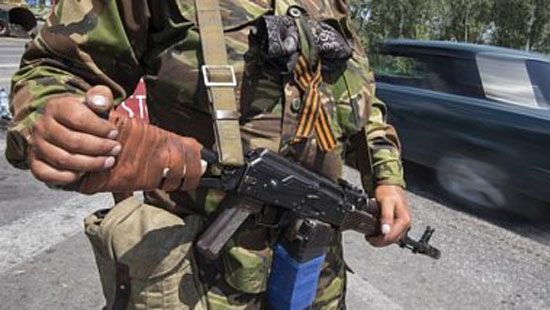Protestant pastor arrested for ‘illegal worship’ in Russian-controlled Luhansk ‘republic’

A Protestant pastor from Sverdlovsk has become the latest religious figure to be arrested in the self-proclaimed and Russian-controlled ‘Luhansk people’s republic’ [LPR]. Although Mykola [Nikolai] Muratov and several other people were released after being interrogated and held for many hours, they were forced to sign undertakings not to leave the area, and were clearly facing ‘prosecution’ for supposedly ‘illegal’ worship.
Information from the occupied Donbas is always very scant. In this case, the initial report came from Sergey Kosyak, the well-known pastor and volunteer who is originally from Donetsk. He avoided giving any name, at the victims’ request, and for their safety, however since all media reports have named Muratov as the pastor arrested, there seems no point in not giving his name here.
Kosyak writes that the pastor and several other people were arrested during the Sunday service at the Evangelical church in Sverdlovsk on 24 March by people from the so-called ‘LPR ministry of state security’. Witnesses report that services in the church have been prohibited. At least the pastor, but probably others, have been summoned for interrogation, with a ‘court hearing’ scheduled for Wednesday, 27 March. Pastor Mykola is apparently well-known for his charitable work, and does not express any political views.
The pretext for the raid on this church and for the ‘prosecution’ of its Pastor and some believers is that the church has not re-registered according to ‘LPR legislation’. In fact, Kosyak points out, not one Evangelical church has received such ‘re-registration’, even those that did submit the documents demanded of them. He says that “arrests, court proceedings against the churches’ pastors and the illegal seizure of houses of worship have become systematic.
We can conclude that in areas not under Ukrainian government control there is a deliberate policy aimed at destroying Evangelical churches. Our brothers and sisters who remain there ask for us to pray for them”.
Russian and pro-Russian militants have persecuted all Christian churches aside from the Orthodox Church under the Moscow Patriarchate since they seized control of parts of Donbas in 2014. The terms ‘sectarians’ appear to be used about all other churches, with Protestants and Jehovah’s Witnesses also labelled ‘extremists’ and ‘spies’
It was reported in October 2018 that ‘LPR’ had refused to ‘re-register’ all communities of Baptist, Pentecostal, Seventh Day Adventist and other Protestant churches, with this meaning that believers could face fines or arrest merely for prayer gatherings in private homes. The fact that nobody received the new ‘registration’ proved that the demand for ‘re-registration’ had always been a ploy to ban the Protestant churches.
Maksym Vasin, Director of the Institute for Religious Freedom [IRF], warned that the information gathered about Evangelical communities and their members could be used for further religious persecution.
IRF had learned from several communities that all Evangelical Christian communities had been turned down, with this equating to an absolute ban on all group religious activities. At least one community reported being told that their premises no longer belonged to them.
A ‘law’ from February 2018 obliged all religious communities under ‘LPR’ control to undergo the so-called re-registration within the next six months, with this later extended until 15 October. The procedure proposed included getting a supposedly ‘expert assessment’, with the latter now cited, seemingly without real explanation, as excuse for rejecting the applications.
This same ‘law’ has effectively placed in question the continued activities of churches that were part of the Ukrainian Orthodox Church of the Kyiv Patriarchate and have now become part of the independent Orthodox Church of Ukraine. Russia has responded very negatively to the creation of a united Ukrainian Church with autocephaly (independent status), and it is likely that the Donbas proxy ‘republics’ will follow suit, as they have with all other forms of religious persecution emerging in Russia (against Jehovah’s Witnesses, for example).
On 28 September 2018, armed ‘LPR’ militants seized an Evangelical Baptist House of Prayer in Brianka and drove out the believers, turning the whole place upside down. They left only after it was made clear to them that the building was the private property of one of the believers.
This was not the first such armed raid and / or seizure of churches in areas until Kremlin-backed militant control. On 6 July this year, Alexander Moseychuk, Pastor of the New Life Church in Makiyivka [under ‘DPR’ control] reported that seven ‘DPR’ militants, some of them armed, had burst into the church and announced that it was being taken over.
In both of the above cases, the churches had been active in helping people in need since the beginning of the military conflict.
According to the Institute for Religious Freedom, there were similar moves on 10 June against the Church of the Holy Spirit in Donetsk, which is under the Ukrainian Orthodox Church of the Kyiv Patriarchate. The church was forcibly closed by people from the so-called ‘DPR state property fund’. On 27 March 2018, men in military gear turned up at a Baptist place of worship in Stakhanov [within ‘LPR’], forced their way into the premises and took out everything, including furniture and items used during services.
Churches under the Moscow Patriarchate have enjoyed special treatment from the beginning, with religious persecution of all other faiths becoming a grave problem from the beginning of the Russian-backed, manned and armed military conflict in April 2014. See, for example, Russia-backed ‘Cossack’ fighters take oath in Moscow Patriarchate church to fight against the Ukrainian ‘enemy’





